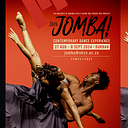Shedding shame, embracing pride, re-embodying self!
By Thembela Sibiya
In 2020 when the COVID-19 pandemic hit and the world was forced into isolation with global lock-downs wreaking havoc, live performance industries and practitioners had a unique opportunity to explore the potentials for re-invention alongside an almost desperate will to survive. In this climate of COVID-19 havoc and public discourse around forced isolation and restricted movement as “the new normal”, many dance and movement artists and practitioners turned to screen-dance as a mode of survival, but also of finding shared connection and freedom of movement, despite our separation. Over this time, 2023 JOMBA! On The Edge grantee, Marcia Mzindle, was immersed in research towards her Masters qualification in Drama and Performance Studies — she had planned on developing a live performance engagement as part of her final project/dissertation, circumstance at the time dictated otherwise. Out of this, her screen-dance work “INTO EMDAKA” which premieres as part of JOMBA!’s 25th Anniversary celebrations, emerged.
On 6 September 2023, I got to experience some of what digital JOMBA! has to offer with Marcia Mzindle’s “INTO EMDAKA” (THE DIRT). Emerging out of our recent pandemic-era when JOMBA! hosted its first fully digital festival in 2020, the festival’s digital platforms now form part of the festival’s hybrid offerings. This year, digital JOMBA! is a small virtual programme that offers live streams of specially curated digital offerings that are screened via the festival’s YouTube channel: https://www.youtube.com/Jomba_Dance.
Mzindle’s digital performance piece centres marginalised identities as they are held in and on the body: Black femaleness and embodied politics meet shifting identities through dance, physical performance and subtexts. As a young Black South African woman and performance maker Mzindle is also on her journey of ubungoma (traditional healing training) and in “INTO EMDAKA” she triangulates her identities between her woman-self, her Blackness (as a social and political construction) and her journey as a traditional healer in training, to create various embodiments of possibility that transcend stereotypical oppressions imposed upon her as a Black African woman and as a traditional healer in training. These identities are referenced on screen through the juxtaposition of images and references like those of a Christian cross where she kneels to pray, alongside “ucansi” (mat), a djembe drum, “ukhamba” (calabash) and an enamel bowl which collectively represent a place where she is able to connect with her ancestors as they guide her in her journey of ‘ubungoma’. Here, the tangible meets the intangible, embodiment meets the possibilities of transcending the discourses imposed upon Black African female bodies.
In the performance she is frequently seen, in cut-away edits, peeling glue, picking it off of her skin — it looks almost like a second skin layer. It is as if she is peeling all that has been considered as shameful and disgraceful away, emerging as an embodied possibility for a new-found self. Her work confronts issues ranging from body shaming, dehumanisation, racism, trash talking, and Black and Brown (African) bodies stripped of power and voice. The image of her alongside the still-standing statue of King George V statue on the UKZN campus where she filmed her work, is a haunting and also powerful reminder of histories past and their very real impact on our present. Mzindle is a symbol of strength as the towering statue standing over her reminds us of the toxicity of power.
She appears on screen wearing traditional clothes of “ubungoma” carrying a bucket with water and a hand-made grass broom, she starts “ukuchela” (a cleansing ritual) on the statue. It’s a breathtaking gesture in the face of the devastation of colonisation on the African continent. This cleansing restores Mzindle’s pride — she becomes a figure, much like Jesus in the Christian faith, absorbing the horrors of histories that have dehumanised Black, Brown and women’s bodies. The juxtaposition of hyper-violence in the statue form of King George V and the absolute usurping of this violence by Mzindle in her act of cleansing and absorbing is a political one. For Mzindle, this act of grace enables her the freedom of possibility that her ancestors were denied.
Her dance is a fusion of traditional and contemporary dance where she deliberately infuses traditional Zulu dancing with its grounded stamps, and low centre of gravity alongside the released fluidity of contemporary dance — her own Afro-fusion style if you will. What emerges is a contemporary portrait of Black African identities that references black bodies that have danced historically in political protest, for healing and for celebration — her refusal to essentialise Black identity as singular is what is most striking to me. Hers is a dance for the restoration and pride beyond racist and patriarchal as well as historical and religious ideals that are so prominently imposed onto our bodies. Her performance ends as she performs a second cleansing ritual, her body covered in blood (a metaphor for the violent impositions on her identity — from colonisation, to apartheid as well as patriarchal ideals that intersect with an undermining of African spiritualities), she takes “Ibomvu” (red clay used for traditional healing and cleansing rituals) and applies it all over her body — washing away the blood. I am reminded here that violence breeds violence, and that Mzindle’s act of cleansing undermines this, offering a will towards healing and humanity. In a final act of cleansing, she pours milk into water and ritualistically washes her body down.
Mzindle’s work is a powerful evocation of the possibilities and potentialities of Black young women despite the weight of histories that they carry on their backs. The added dimension of spirituality in her work elevates its possibilities beyond the realms of what is seen, known and imposed. It’s a layered and complex work that introduces Mzindle as an emerging Durban-based artist and I do hope that in festivals to come, we will get to witness more of Mzindle and her work!
